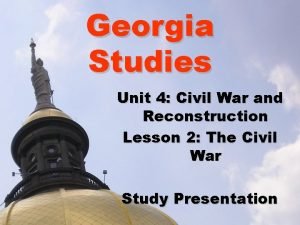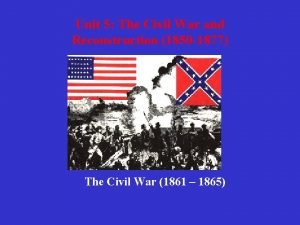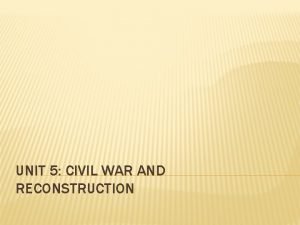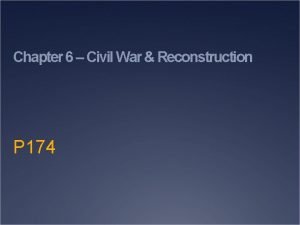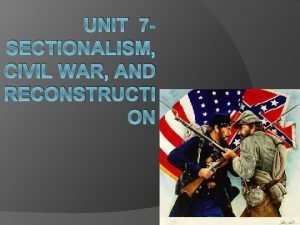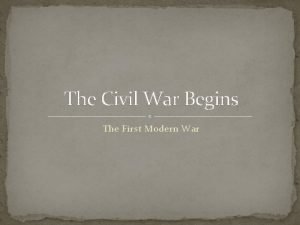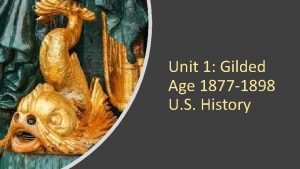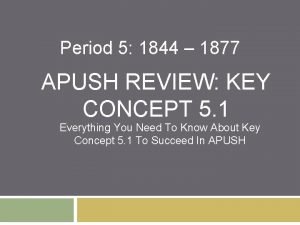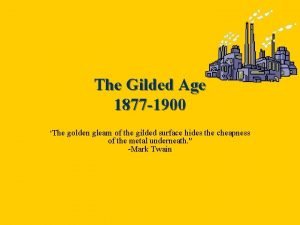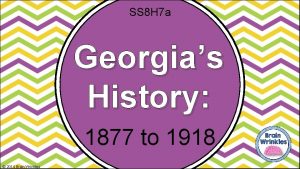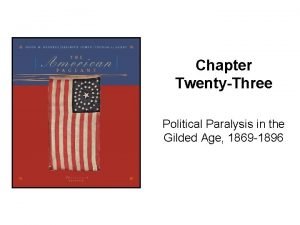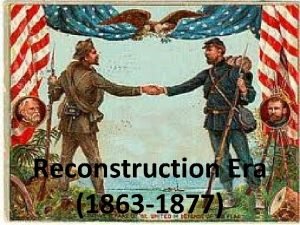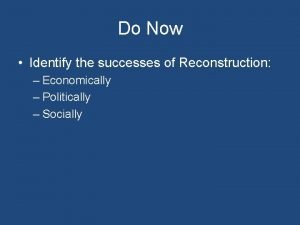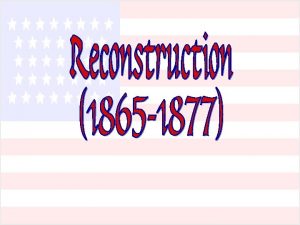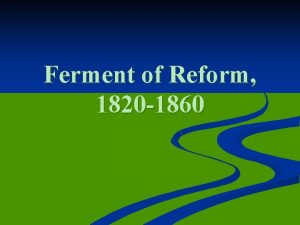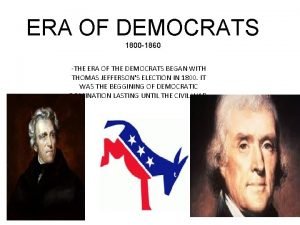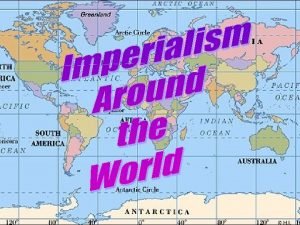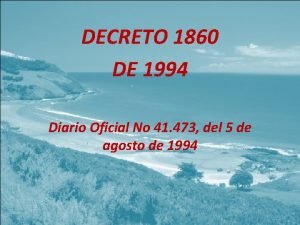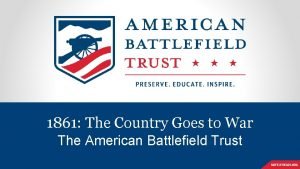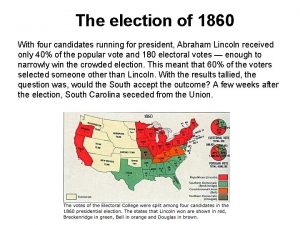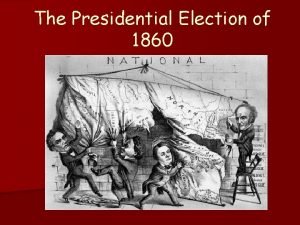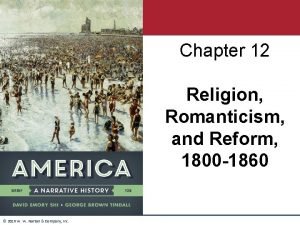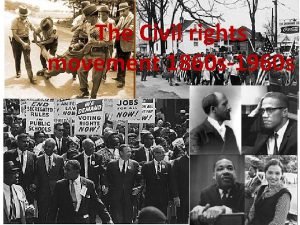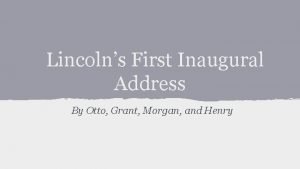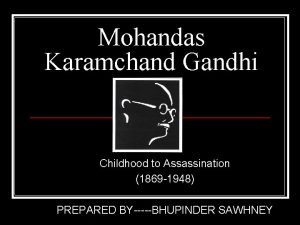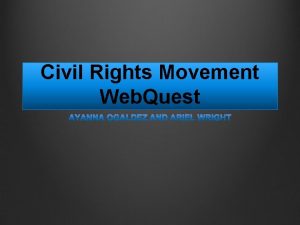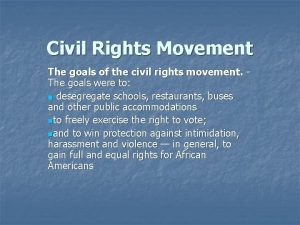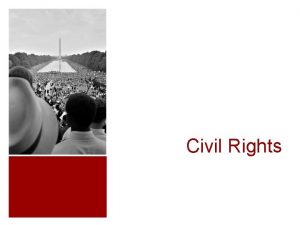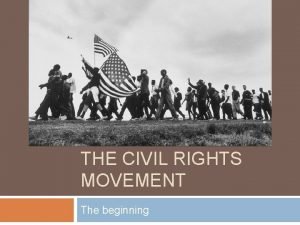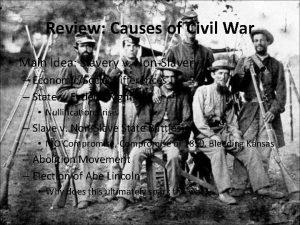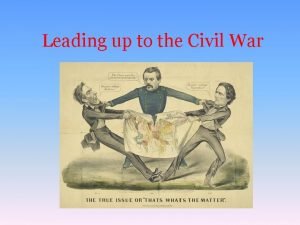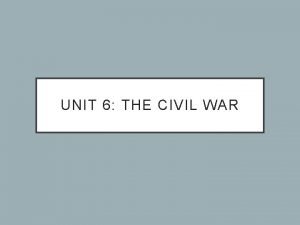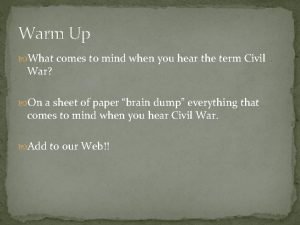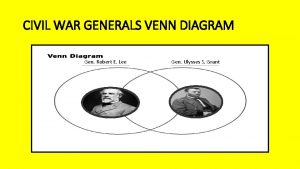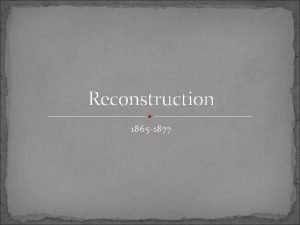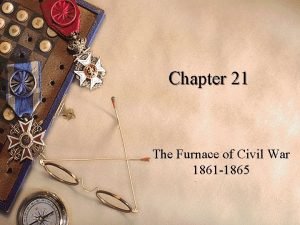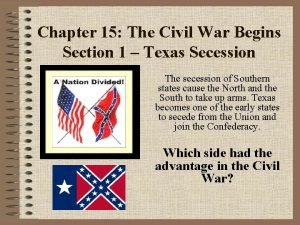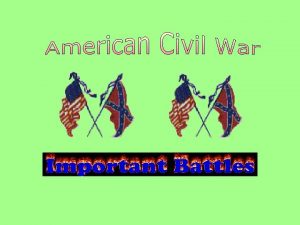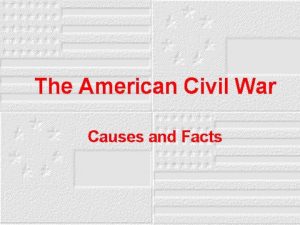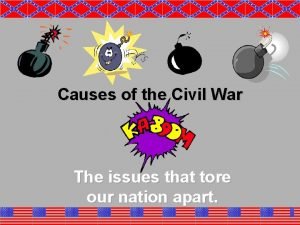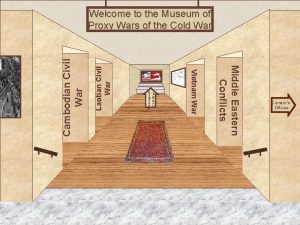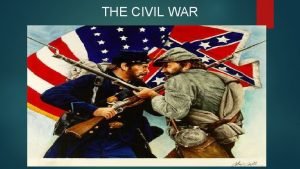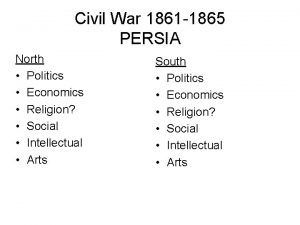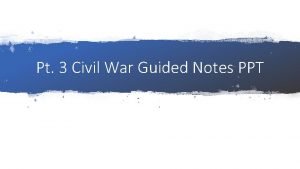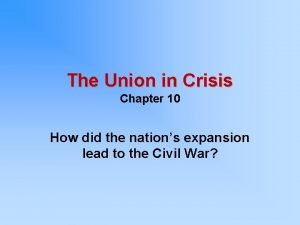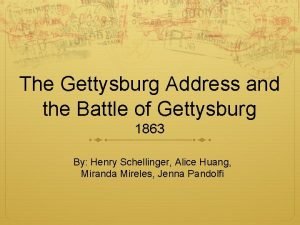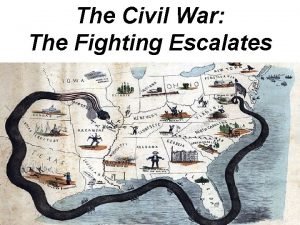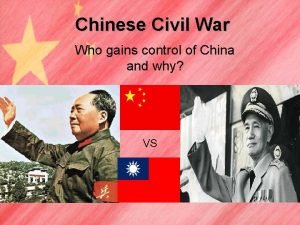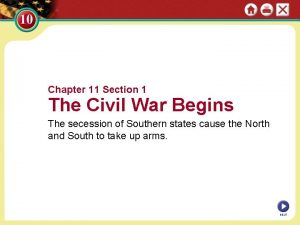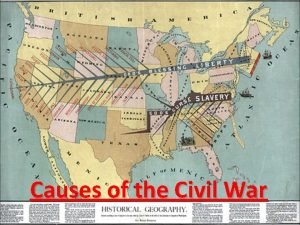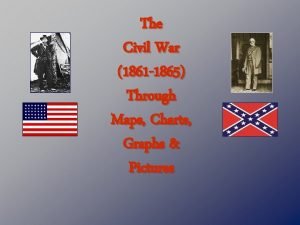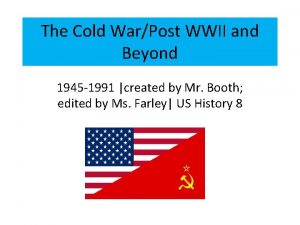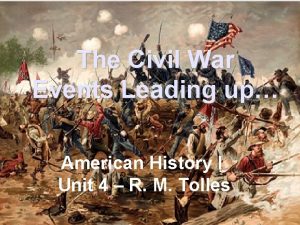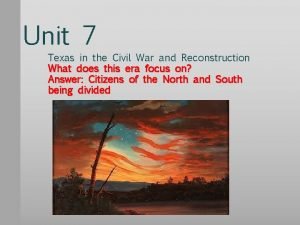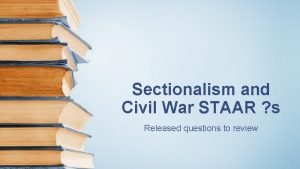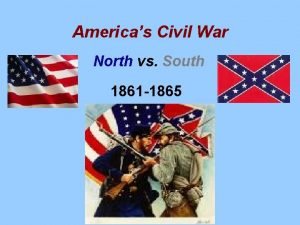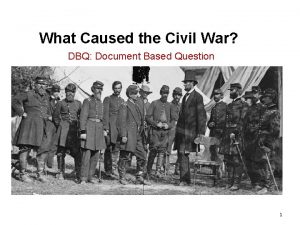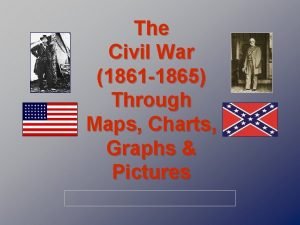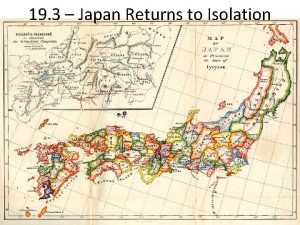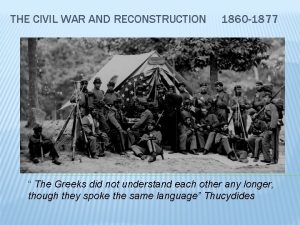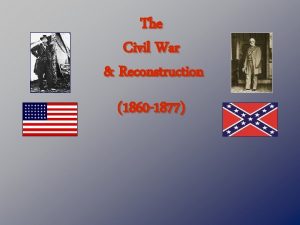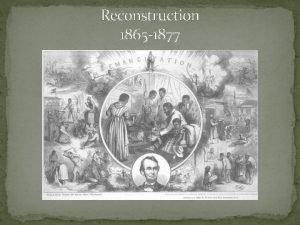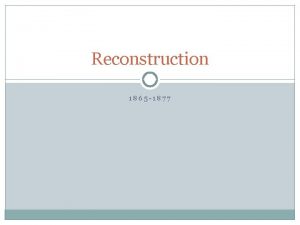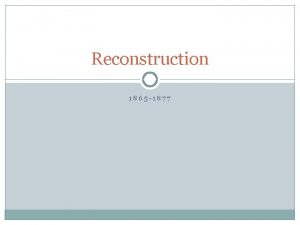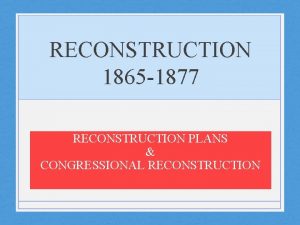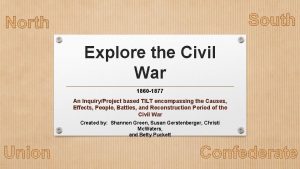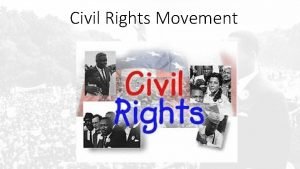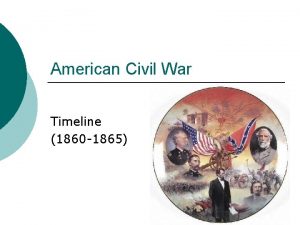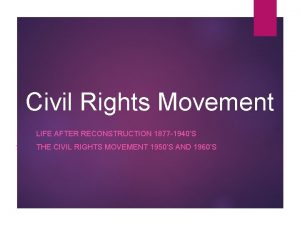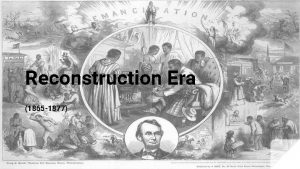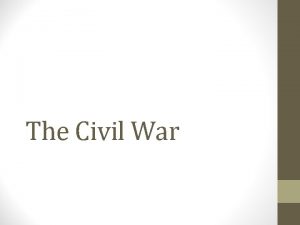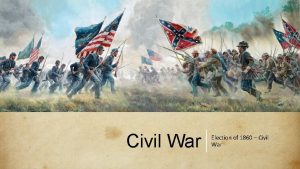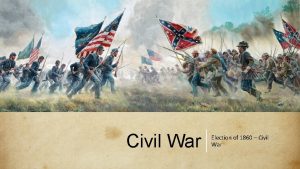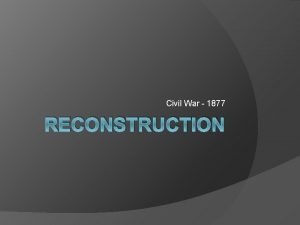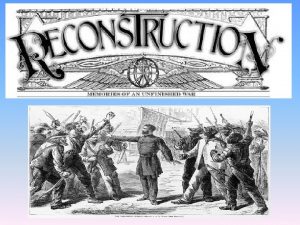Civil War Reconstruction 1860 1877 Antislavery Movement l
























































































- Slides: 88

Civil War / Reconstruction 1860 -1877

Antislavery Movement l Moderates favored gradual abolition with compensation for owners l Radicals believed in immediate emancipation with no compensation l Belief in the moral wrongness of slavery grew out of the Second Great Awakening

l American Colonization Society l Wanted to transport freed slaves to Africa l Only 12, 000 were resettled l Meanwhile the slave population grew by 2. 5 million Lloyd Garrison founded The Liberator in 1831 to promote the abolitionist cause l William l 1833 helped to found the American Antislavery Society l Liberty Party: founded to oppose Garrison & more radical abolitionists l End slavery by political legal means

l Violent abolitionism l David Walker & Henry Highland Garnet advocated that slaves should revolt against their masters l Nat Turner’s Rebellion l 1831: 55 whites were killed in Virginia l Hundreds of African Americans were brutally killed in retaliation l This put an end to any antislavery talk in the south

Territorial Expansion l Wanted to see the U. S. expand to the Pacific & south into Mexico, Cuba, & Central America l Manifest destiny l Nationalism l Population increase l Rapid economic development l Technological advances l Reform ideals l Controversy is created over whether or not to allow slavery to spread into western lands

Texas l American settlers led by Sam Houston revolted and declared Texas a republic in 1836 l Requested annexation l John Tyler’s request was denied in 1844 but he pushed it through in 1846 l War broke out the same year over an incident in which an army patrol killed 11 U. S. soldiers l Tyler requests Congress declare war

Treaty of Guadalupe Hidalgo 1848 l U. S. forces overthrew Mexican rule in California & pushed into Mexico and eventually captured the capital at Mexico City l Mexico was forced to recognize the southern border of Texas at the Rio Grande l U. S. took California & New Mexico in addition to Texas l Paid $15 million to Mexico

Consequences of the Mexican. American War l Increased tensions over slavery l Many in the North saw this as an attempt by southerners to extend slavery in to new areas l Some expansionists wanted to take all of Mexico l Wilmot Proviso l Would have forbid slavery in the new territories acquired from Mexico l Defeated in the Senate

Maine l Disputes arose in the 1840 s over the southern boundary of Canada l Canada still under British rule l Aroostook War l Settled in 1842 by the Webster-Ashburton Treaty l Split the disputed territory in half l Also settled the boundary in Minnesota Territory

Oregon l U. S. had laid claim to the region through: l Captain Robert Gray’s discovery of the Columbia River in 1792 l Lewis & Clark expedition in 1805 l Fur trading post owned by John Jacob Astor in 1811 l Settlers which traveled to the region

l James Polk pushed Congress to settle for the southern half of Oregon in 1846 l Congress reluctantly agreed, but did not want to fight Mexico & Britain

l Ostend Further Expansion Manifesto: Polk attempted to purchase Cuba from Spain l Walker Expedition: attempted to take Baja California from Mexico in 1853 l took over Nicaragua in 1855 l Clayton-Bulwer Treaty: agreement that neither Britain or U. S. would attempt to take exclusive control of a canal through Central America l Gadsden Purchase: 1853 U. S. bought New Mexico & Arizona territory for $10 million

Tension Rising

Free Soil Party l Northerners who were in opposition to the extension of slavery to the territories l Wanted to leave slavery alone in the south l Advocated free homesteads in the west l Moderate southerners wanted to extend the Missouri Compromise line of 36° 30’ to the Pacific

Popular Sovereignty l Lewis Cass supported the idea of allowing popular sovereignty to determine the issue of slavery in the territories l Cass ran against Zachary Taylor in 1848

Compromise of 1850 l Gold rush of 1848 meant that California was ready to be a state l New Mexico also met the requirements l Would upset the delicate power balance l Henry Clay proposed a solution: l Admit California as a free state l Divide the Mexican cession into Utah & New Mexico & allow popular sovereignty l Ban the slave trade in Washington, D. C. l Adopt a new Fugitive Slave Law

Election of 1852 l Whigs nominated General Winfield Scott l Campaigned on plan to improve roads & harbors l Antislavery & southern factions almost split the party due to fighting over slavery l Democrats l Supporter nominated Franklin Pierce of the Fugitive Slave Law l Won all but four states

Kansas-Nebraska Act 1854 l Divided Kansas & Nebraska into two parts l Allow settlers in the territories to decide on the issue of slavery l Essentially repealed the Missouri Compromise l Led to great violence & bloodshed as proslavery and abolitionist sent settlers to the areas l John Brown: abolitionist and his sons attack a pro-slavery settlement at Pottawatomie Creek,

Caning of Senator Sumner l Charles Sumner gave a speech attacking the Democratic administration under Pierce l Included personal remarks against Andrew Butler l Butler’s nephew Preston Brooks attacked Sumner in the Senate chamber, breaking his cane over Sumner’s head

Birth of the Republican Party l Founded in 1854 in Wisconsin l Opposed the extension of slavery, but not its existence in the south l More and more abolitionists began to join the party l As it was a northern, sectionalist party, its growth alienated & threatened the south ***

Election of 1856 l Republicans nominate John C. Fremont l No slavery expansion, free homesteads, probusiness protective tariff l Took 11 of 14 free states l Signaled that Republicans were a growing force l Know-Nothings nominate Millard Fillmore l Democrats nominate James Buchanan

Dred Scott v. Sandford 1857 l Dred Scott had been held in slavery in Missouri and was then taken to the free state of Wisconsin where he lived for two years before returning to Missouri l Scott sued for freedom based on his residence in a free state l Court ruled that Scott could not sue in court because he was not a citizen l Also ruled that Congress could not exclude slavery from any federal territory (Missouri Compromise was unconstitutional)

Lincoln-Douglas Debates l Lincoln had formerly been a member of the Illinois legislature as a Whig l 1858 he challenged Senator Stephen Douglas for the Illinois Senate seat l Not an abolitionist, he still alarmed southerners with his statements l Douglas won, but Lincoln emerged as a national figure

Mid-term 1858 l Republicans won many seats across the U. S. l Southerners worried about: l Abolitionism l Higher tariffs

John Brown’s Raid at Harper’s Ferry l October 1859: Brown led a group of followers to a federal arsenal at Harper’s Ferry l Plan was to arm Virginia’s slaves l Federal troops under Robert E. Lee captured Brown l He and six others were tried for treason, convicted, & hanged by the State of Virginia

Events leading to war l North & South were fighting for political power, mainly in the Senate l The Election of 1860 l Republicans nominate Abraham Lincoln l Democrats split= easy Republican victory l Stephen Douglas l John C. Breckinridge l John Bell

Lincoln

Stephen Douglas

John C. Breckinridge

John Bell

l When Election 1860 (cont. ) the results become known (Lincoln wins) the southern states call their legislatures into session to vote on secession (leaving the union) l South Carolina, Mississippi, Alabama, Georgia, Florida, Louisiana, and Texas vote to secede, or to leave, the Union l Together America they form the Confederate States of

Attack on Fort Sumter l The North refuses to evacuate Fort Sumter located in Charleston Harbor in South Carolina l When supply ships appear, South Carolinians fire on the fort & capture it. l Lincoln calls for volunteers to put down the rebellion l Four more states secede: Virginia, North Carolina,

Crash Course U. S. History Civil War Part 1 l https: //www. youtube. com/watch? v=r. Y 9 z. H NOj. Grs

Fort Sumter, in Charleston Harbor


Strategy l The North greatly outnumbered the South, and they had everything they needed to fight l The South always fought outnumbered and under-armed

l The North established blockades of the coasts = prevent supplies from reaching the South l The South had better officers, more experience with guns & horses, and, in most cases, the home field advantage


l July Battle of Bull Run 21, 1861 l “Stonewall” Jackson & his men stood against the Yankees. Confederate reinforcements arrive unexpectedly, and panic seized the Union troops. l Early l Southern Victory Had the Southerners pursued them, they possibly could have taken Washington, D. C. and won the war

Battle of Antietam l 1862: took place in Maryland. l Robert E. Lee was trying to encourage foreign countries to intervene on the South’s behalf & additional border states to join the Confederacy l It was a bloody battle, but a draw militarily l Lincoln used it as an opportunity to launch the Emancipation Proclamation

Confederate & Union dead after Antietam

l Lincoln after the Battle of Antietam with Allan Pinkerton (left) & General John Mc. Clernand (right)

Emancipation Proclamation l Declared free all slaves in states in rebellion against the Union. l The document did not actually free the slaves. l What it DID do was strengthened the moral cause of the Union (their reason for fighting) & prevented foreign aid to the Confederacy. l Ensured their loss

Areas covered by the Emancipation Proclamation (in red)

Battle of Gettysburg l Lasted for three whole days in 1863. l It was a bloody victory for the North, and was the last real chance for the South to convince foreign countries to come to their aid. l 50, 000 died at Gettysburg

Union dead at Gettysburg, 1863

Siege of Vicksburg l 1863: Vicksburg, Mississippi was the last stronghold keeping the Union from having complete control of the vital Mississippi River. l MS River imp. = supplies & transportation

l Union soldiers surrounded Vicksburg & prevented supplies from reaching the city l The city surrendered after being reduced to eating rats, mules, and boiled shoe leather to survive. l The l Neat South was cut in half fact: The hand grenade was invented by a Southerner at Vicksburg

Siege of Vicksburg from Kurz & Allison

U. S. General Grant

C. S. A General John C. Pemberton

Union fortifications at Vicksburg 1863

Sherman’s March l General Sherman captured the city of Atlanta in September 1864. l From Atlanta, he and his troops marched to 250 miles to Savannah on the coast Sherman’s troops burned & destroyed a 60 mile wide path through the south l Intention = make people lose interest in fighting the war l l “…make Georgia howl. ” ~ General Sherman

Sherman’s Troops

Sherman’s Path

Appomattox Courthouse l 1865: General Robert E. Lee surrendered & the Civil War ended l The Civil War had ended, but the job of rebuilding the nation, or Reconstruction, had just begun. l The South as it had been was Gone with the Wind

Appomattox Courthouse

Reconstruction 1865 -1877 l Reconstruction= the program the federal government carried out to restore the Southern states to the Union l South l Very before the Civil War: wealthy & prosperous l Economy depended on an agricultural system in which plantations produced cotton using slave labor

Reconstruction (cont. ) l After l 2/3 the Civil War… of the South’s shipping industry & 9, 000 miles of railroads were destroyed (transportation routes) l Homes, farm land, farm buildings, farm machinery, livestock, bridges, canals, ports, cities, etc. were destroyed l The value of southern farm property plunged 70% l 1/5 of the South’s adult white male population were killed in the war

Postwar South l Black Southerners l Most had previously been slaves l Needed jobs, education, & all of the basics of life (food, clothing, shelter, etc. ) that had previously been provided by slave owners l Freedmen’s Bureau was set up to meet these demands. l Was short lived because it lacked Congressional support l Dismantled by 1869

13 th Amendment Abolished slavery l Passed in 1865 after Lincoln’s death l

Lincoln’s Reconstruction Plan l He resisted attempts by Congress to place heavy restrictions on Southerners l His plan was not used because on April 14, 1865, he was assassinated by John Wilkes Booth in Ford’s Theatre while watching a play. l Play= Our American Cousin

Ford’s Theatre l


Johnson’s Reconstruction Plan l Andrew Johnson’s Reconstruction plan was even more lenient than Lincoln’s l Because he was a Southerner, Radical Republicans in Congress accused him of being biased in the South’s favor l Congress wanted to punish the South l Radical Republicans in Congress passed the Radical Reconstruction Act of 1867 which allowed them to take control of Reconstruction

Congressional Reconstruction l The Radical Reconstruction Act of 1867 placed the South under strict military control l The states were stripped of statehood (they were no longer states) & were divided into five military districts l In order to become states again, they had to meet special requirements such as l Creating new constitutions l Guarantee equal rights l Ratify (pass) the 13 th, 14 th, & 15 th Amendments

Military Division of the South

Black Codes l Black Codes were restrictions placed upon freedmen. They were also one of the reasons that Congress took over Reconstruction l Examples of Black Codes include: l Curfews l Vagrancy laws (laws against not working) l Restrictions on where freedmen could own land


New Amendments l 14 th ~ Gave newly freed slaves (freedmen) citizenship l 15 th ~ Gave freedmen the right to vote l After the 1870 elections, due to freedmen voting for the first time, Republicans were swept into office across the South. l Many African Americans were elected to political office for the first time

African American Senators elected after changes in Southern gov.

“New South” Grady of the Atlanta Constitution called for a New South of growing cities and thriving industries l Carpetbaggers~ Northerners who came to the South after the Civil War l Scalawags~ Southerners who after the Civil War ended turned Republican l Solid South~ term meaning that the South was mostly Democratic. l Henry l The power of the Democrats was broken during Reconstruction

Gospel of Prosperity l The belief that the growth of business would bring better times for everyone

Carpetbag Rule or Rule of the Republicans


Johnson’s Impeachment l Tenure of Office Act ~ Demanded that the Senate approved the hiring & firing of certain officials by the President l Johnson fired Secretary of War Edwin Stanton without the approval of Congress l Congress did not approve of Johnson anyway l They brought articles of impeachment against him l He was almost removed: he escaped by 1 vote

Texas v. White l Supreme Court ruling that added weight to Reconstruction l 1869 l Said that it was illegal for any state to secede from the Union l Added power & support for federal power over that of state’s rights

Sharecropping l After jobs the Civil War, freedmen had to find l Many traveled the South looking for family l Most went to work for the plantation owners who had previously owned them as slaves l Sharecropping~ Family farmed a portion of a planter’s land. As payment, the family promised a share of the crop at harvest time.




l In Sharecropping (cont. ) sharecropping, the planter provided housing & credit at a local store. l By the time that the harvest came in, the family owed more money than they received for their crops. l They then started out the next year already in debt, and most of the time continued to get deeper & deeper in debt l Sharecropping became another form of virtual slavery


Tenant Farming l. A system that is similar to sharecropping l Instead of giving the landowner a share of the crop however, the tenant farmer rented the land. l Tenant farming was not much better than sharecropping however as they often became indebted to local stores also.

l Started Ku Klux Klan when six former Confederate soldiers decided to pretend to be ghosts of soldiers returned for revenge l It turned into a way to intimidate & harass people who chose to vote for the Republicans l Enforcement Act of 1870~ banned the use of terror, force, or bribery to keep people from voting. Was ineffective.

Compromise of 1877 l Presidential l Samuel Election of 1876 Tilden (D) v. Rutherford B. Hayes (R) l Tilden won the majority of the popular vote while Hayes won the majority of the electoral vote (the one that actually decides who becomes President) l Tilden & the Democrats agree to concede (give up) the election to Hayes & the Republicans if they would remove the federal troops & end Reconstruction l Marks the end of Reconstruction

Emancipation from the Freedman’s Viewpoint from Harper’s Weekly

THE END
 Unit 4 civil war and reconstruction
Unit 4 civil war and reconstruction Unit 5 civil war and reconstruction
Unit 5 civil war and reconstruction Civil war and reconstruction study guide
Civil war and reconstruction study guide Reconstruction vocabulary words
Reconstruction vocabulary words Chapter 6 civil war and reconstruction
Chapter 6 civil war and reconstruction Quizlet
Quizlet Civil war first modern war
Civil war first modern war Toward civil war lesson 3 secession and war
Toward civil war lesson 3 secession and war Civil rights and civil liberties webquest
Civil rights and civil liberties webquest The gilded age 1877 to 1898 worksheet answers
The gilded age 1877 to 1898 worksheet answers Anthony comstock apush
Anthony comstock apush 1877 golden 1
1877 golden 1 Great railroad strike of 1877 significance
Great railroad strike of 1877 significance Compromise of 1877
Compromise of 1877 Tanssija 1877-1927
Tanssija 1877-1927 Bourbon triumvirate definition
Bourbon triumvirate definition The key tradeoff featured in the compromise of 1877
The key tradeoff featured in the compromise of 1877 Gilded age union strikes
Gilded age union strikes Reconstruction art definition
Reconstruction art definition Compromise of 1877 apush
Compromise of 1877 apush Whats the compromise of 1877
Whats the compromise of 1877 1877-1865
1877-1865 American romanticism 1800 to 1860 worksheet answers
American romanticism 1800 to 1860 worksheet answers Ancetre de l'aspirateur
Ancetre de l'aspirateur American reform movements between 1820 and 1860
American reform movements between 1820 and 1860 American romanticism 1800 to 1860 worksheet answers
American romanticism 1800 to 1860 worksheet answers Whig party beliefs
Whig party beliefs American romanticism 1800 to 1860 worksheet answers
American romanticism 1800 to 1860 worksheet answers The romantic period in american literature
The romantic period in american literature South africa 1860
South africa 1860 Decreto 1860 de 1994
Decreto 1860 de 1994 South carolina 1860
South carolina 1860 Map of 1860
Map of 1860 Election of 1860 definition
Election of 1860 definition Chapter 12: religion, romanticism, and reform, 1800–1860
Chapter 12: religion, romanticism, and reform, 1800–1860 1860
1860 Border states in 1860
Border states in 1860 Election of 1860 pie chart
Election of 1860 pie chart Arthur and lewis tappan apush
Arthur and lewis tappan apush Program of civil disobedience movement
Program of civil disobedience movement Civil rights movement vocabulary
Civil rights movement vocabulary Civil rights movement essential questions
Civil rights movement essential questions Civil rights movement jeopardy
Civil rights movement jeopardy Civil rights movement webquest
Civil rights movement webquest Goals of the civil rights movement
Goals of the civil rights movement Rosa parks mother
Rosa parks mother Civil right movement def
Civil right movement def The civil rights movement
The civil rights movement Blockade
Blockade What led to the civil war
What led to the civil war Diseases in civil war
Diseases in civil war Causes of civil war
Causes of civil war English civil war mind map
English civil war mind map Robert e lee and ulysses s grant venn diagram
Robert e lee and ulysses s grant venn diagram Aftershock beyond the civil war
Aftershock beyond the civil war Who shot john wilkes booth
Who shot john wilkes booth States rights
States rights Causes of the english civil war
Causes of the english civil war The civil war affected the northern economy by:
The civil war affected the northern economy by: Mississippi civil war sites map
Mississippi civil war sites map North vs south civil war
North vs south civil war Civil war
Civil war Civil war facts
Civil war facts What are the 3 main causes of the civil war
What are the 3 main causes of the civil war Viet cong flag
Viet cong flag The civil war ended
The civil war ended Deaths in civil war
Deaths in civil war Civil war advantages and disadvantages chart
Civil war advantages and disadvantages chart Ppt
Ppt Civil war trading cards project
Civil war trading cards project Civil war battles
Civil war battles What battle was the turning point of the civil war
What battle was the turning point of the civil war The civil war the fighting escalates
The civil war the fighting escalates Who
Who The civil war
The civil war Chapter 11 section 1 the civil war begins answer key
Chapter 11 section 1 the civil war begins answer key Northwest ordinance lead to civil war
Northwest ordinance lead to civil war Civil war 1861/1862
Civil war 1861/1862 Causes of the civil war jeopardy
Causes of the civil war jeopardy Civil war digging deeper webquest answers
Civil war digging deeper webquest answers Image
Image Effects of the civil war
Effects of the civil war Civil war staar questions
Civil war staar questions Us north vs south
Us north vs south Causes of the civil war dbq
Causes of the civil war dbq Who were abolitionists
Who were abolitionists Civil war readers theater
Civil war readers theater Japan civil war 1467
Japan civil war 1467 Analyse guernica
Analyse guernica
